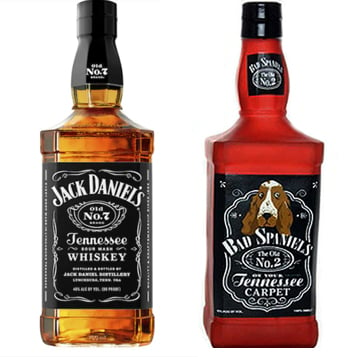Supreme Court Holds That Trademark Infringement Is No Laughing Matter

Example of the Jack Daniels bottle (left) and the Bad Spaniels dog toy (right).
Last week, the Supreme Court issued a much-anticipated ruling in Jack Daniels Properties v. VIP Products. The case concerned whether trademark holders could enforce their rights where their trademark is used as a part of a parody or other “expressive” work. In a favorable holding for trademark owners, the high court said “yes,” holding that when an accused infringer has used a trademark to designate the source of its own goods — in other words, used a trademark as a trademark — no special First Amendment considerations apply, and courts should apply the ordinary trademark infringement and dilution analysis.
The case centered around plaintiff VIP Products’ “Bad Spaniels” dog toy. The toy at issue in the case mimicked the iconic square-shaped bottle of Jack Daniel’s whiskey, using a similar shape, size, and font as the original. For the punchline, in place of the original’s “Old No. 7 Tennessee Sour Mash Whiskey” label, the toy’s label read, “Old No. 2 On Your Tennessee Carpet.”
The lower appeals court ruled that the dog toy seller was not liable to Jack Daniel’s for trademark infringement because the toy was a parody of the Jack Daniel’s brand. In reaching this holding, the lower court relied on the “Rogers Test,” which holds that a so-called “expressive” use of a trademark in an artistic work does not amount to trademark infringement unless the use either (1) “has no artistic relevance to the underlying work” or (2) “explicitly misleads as to the source or content of the work.” Since neither exception applied, the lower court found that Rogers protected VIP Products’ parody. Similarly, the lower court found that Jack Daniel’s trademark-dilution claim was barred by the “noncommercial use” exception in the trademark statute.
The Supreme Court reversed. Although it did not comment on the validity of the Rogers Test — which the Supreme Court has never endorsed, but various federal courts have adopted — it noted that that the lower court went beyond the traditional scope of the test.
The Rogers test typically applies where an artistic work references a trademark but does not imply that it was made by, affiliated with, or endorsed by the trademark’s owner. For instance, the original Rogers case involved an Italian film called “Ginger and Fred” about two dancers who imitated Ginger Rogers and Fred Astaire. The Second Circuit Court of Appeals held that, although Ginger Rogers had a protectable interest in her name, the reference to her in the film’s title had only a “slight risk” of causing consumers to believe that she had endorsed or was involved in the film. Given this slight risk, along with the “First Amendment values” implicated by artistic works, the film’s title did not amount to trademark infringement.
Another famous example, referenced by the Supreme Court’s opinion, is the song “Barbie Girl” by the band Aqua. Although the song referenced Mattel’s famous “Barbie” trademark, the reference was used to comment on the Barbie brand, rather than as a “source identifier.” As the Ninth Circuit wrote in rejecting Mattel’s trademark infringement lawsuit based on the song, the song did not “identify the producer” of the song as Mattel, but instead offered an artistic commentary on the “Barbie” character herself.
In contrast, VIP Products’ “Bad Spaniels” toy had appropriated Jack Daniels’ distinctive trade dress — including the iconic square bottle, black label, and script — as an identifier of its own product, selling the toy under the “Bad Spaniels” brand. VIP Products even registered the “Bad Spaniels” trademark. As the court put it, VIP Products used the Jack Daniel’s trademark “as a trademark” rather than for “some other expressive function.” Accordingly, even if the First Amendment values underlying the Rogers test protect some expressive uses of trademarks that would otherwise amount to infringement, it did not protect this one.
The Supreme Court also rejected the lower court’s decision that VIP Products’ parody was protected by a “noncommercial use” exception in the trademark-dilution statute. The court observed that this exception does not extend to uses “as a designation of source for the person’s own goods or services.” Because VIP Products used a mark similar to Jack Daniel’s’ as a brand identifier for its own products, the exception did not apply.
The practical effect of the court’s ruling is a simplification of the legal analysis that trademark users and their counsel should undertake prior to the adoption of a brand. Further, mark holders will have a clearer path forward in enforcing their rights against junior users that may have otherwise relied on a murky set of rights centered on free speech concepts. While the “likelihood of confusion” used to test trademark-infringement claims may be debated between junior and senior brand users, the court’s ruling clarifies the rules of the game that will apply in those disputes going forward.
For questions about this decision or its impact, please contact a member of the firm’s Intellectual Property practice.
In This Article
You May Also Like
Fed. Circ. Skinny Label Ruling Guides On Infringement Claims Supreme Court Strips SEC of Critical Enforcement Tool in Fraud Cases in Jarkesy Decision